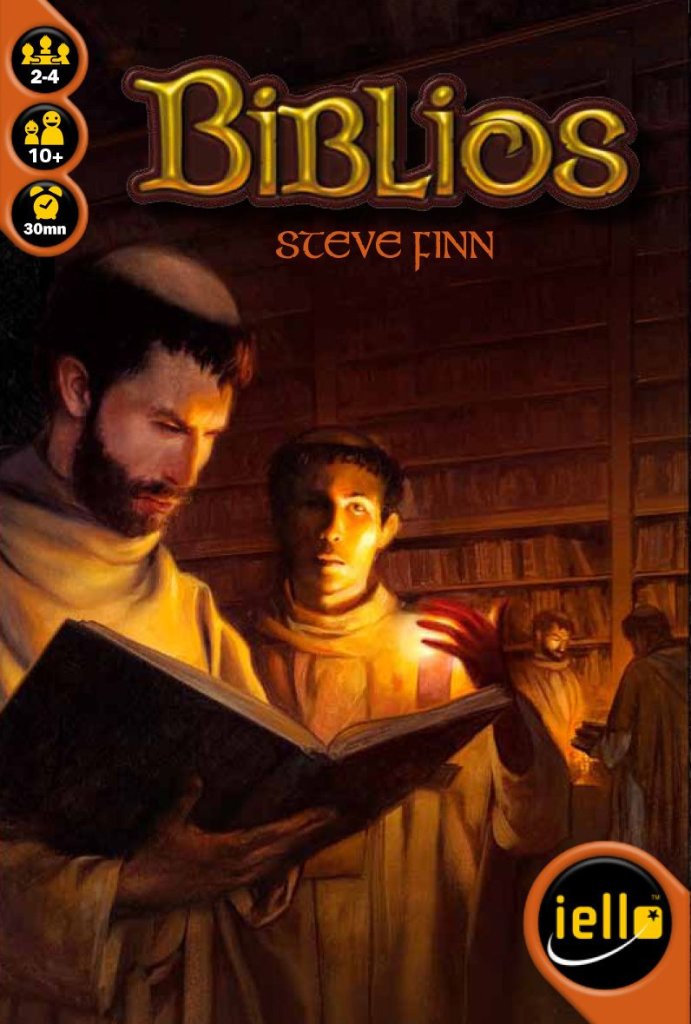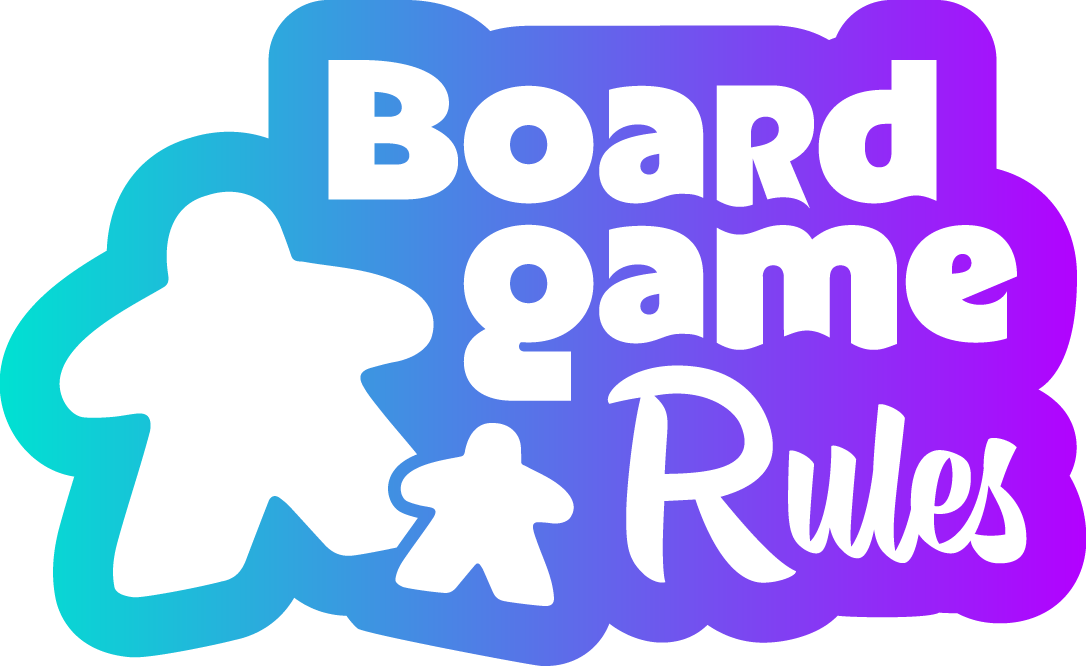Biblios
2007
Step into the role of a medieval abbot, strategize, bluff and rely on a bit of luck to amass the greatest library of sacred books. Compete in auctions, manage resources and earn victory points in this engaging and challenging board game.
30
minutes
2 - 4
player(s)
10+
Medium Light


About the game
Welcome to the world of Biblios, a richly thematic and highly strategic board game that revolves around the intriguing world of medieval monasteries and manuscript creation. In this game, players step into the shoes of an abbot at a medieval monastery, competing to amass the most impressive library of sacred texts.
Set in the heart of the Middle Ages, the game’s setting is characterized by its historical accuracy and immersive atmosphere. The richly detailed artwork and components, from the meticulously crafted cards to the custom dice, transport players back to a time of quills, parchment, and candlelight.
Read More
Setup and rules summary
Game components Unboxing the fun!
The game of ‘Biblios’ comes with several different components, each of which plays a crucial role in the gameplay. Here’s a list of the components included in the game, along with descriptions of what each one does and how they interact with the game:
1. 87 Cards:
The cards in ‘Biblios’ are split into several different types:
- Gold cards: These cards represent the currency in the game. Players use gold to bid on items in the auction phase of the game.
- Church cards: These cards represent the influence of the church. Players collect these cards to influence the monks and increase their victory points.
- Category cards: These come in five different categories: Pigments, Holy Books, Manuscripts, Forbidden Tomes, and Skulls. Players collect these cards to gain majority in different categories and score victory points at the end of the game.
2. Five 6-sided Dice:
Each die corresponds to one of the five categories of the category cards. The dice start with a value of ‘3’, but their values can be increased or decreased throughout the game using certain cards. The value on a die at the end of the game determines the number of victory points awarded to the player who has the majority in that category.
3. Rulebook:
The rulebook provides all the necessary information on how to play the game. It contains instructions on game setup, rules on how to play, and details on how to score at the end of the game.
4. A Starting Player Marker:
This is used to indicate which player is the current starting player. The starting player changes throughout the game, and this marker helps to keep track of who is currently in this role.
Game setup Lay it out, line it up, let’s go
Biblios is a strategic board game where players take on the role of an abbot in a medieval monastery, competing to amass the greatest library of sacred books. Here’s a step-by-step guide on how to set up the game:
Step 1: Setting up the Game Components
- Place the game board in the center of the table: The board has five different colored areas that correspond to the five categories of cards: blue, green, brown, red, and yellow.
- Place the colorful dice on the game board: A dice of a specific color should be placed on the corresponding color area on the board. Each die starts with a value of ‘3’.
Step 2: Preparing the Deck of Cards
- Separate the deck into two types of cards: The cards with a die symbol on the back are auction cards, while the rest are library cards.
- Shuffle both decks separately and put them face down on the table. The library cards form the draw pile.
- Prepare the library deck: Draw cards from the library pile equal to the number of players multiplied by eight. For example, if there are four players, draw 32 cards. This will be the library deck for the game.
Step 3: Determining the First Player
- Randomly select a player to be the first abbot: This player will start the game and perform the initial card distribution.
Step 4: Initial Card Distribution
- The first abbot draws cards from the library deck: The number of cards drawn should be equal to the number of players plus one. For example, in a four-player game, the abbot would draw five cards.
- Look at the cards and decide: The abbot looks at the cards in private and decides which card to keep, which cards to give to other players, and which card to donate to the auction. Each player should receive one card, and one card should be placed face down in the auction pile.
Step 5: Start the Game
- Rotate the role of abbot: After the initial distribution, the abbot role moves clockwise. The new abbot repeats the card distribution process. This continues until the library deck is exhausted.
- Begin the auction phase: Once the library deck is exhausted, the auction phase begins. Players bid on the cards in the auction pile using the gold they have accumulated during the library phase.
Now that the game is set up, players can begin to strategize and compete to build the most impressive library in the monastery. Enjoy the game!
Game flow Round and round we go
Biblios is a strategic card game where players take on the role of an abbot of a medieval monastery. The game comprises two main phases: the Gift Phase and the Auction Phase. Each phase involves different actions and strategies.
The Gift Phase:
In the Gift Phase, the active player draws cards from the deck, one at a time, and decides where to assign them. The number of cards drawn is equal to the number of players plus one. For each card drawn, the active player may:
- Keep the card for themselves.
- Put the card in the auction deck for use in the Auction Phase.
- Give the card to another player.
These decisions are made one at a time, without knowing what future cards will be drawn. The goal is to collect cards that will be useful later or to keep them away from other players.
The Auction Phase:
Once the draw deck is exhausted, the game moves to the Auction Phase. This phase consists of a series of auctions for the cards that were put into the auction deck during the Gift Phase. The auctions are carried out in the following manner:
- Reveal the top card of the auction deck.
- Each player bids or passes. The active player has the final say in case of a tie.
- The highest bidder pays their bid by discarding an equivalent amount of gold cards, and then takes the auctioned card.
These steps are repeated until all cards in the auction deck have been auctioned off.
The game concludes after the Auction Phase. Players then calculate their scores based on the cards they have collected. The player with the highest total score wins the game.
Players'turn One turn to rule them all
In the game of Biblios, a player’s turn is split into two phases: the Gift Phase and the Auction Phase. Each phase comes with its own set of actions and strategic choices, which greatly affect the gameplay.
Gift Phase
During the Gift Phase, the active player draws cards from the deck equal to the number of players plus one. One at a time, they examine the cards and decide which to keep, which to give to each opponent, and which to place in the auction pile for the Auction Phase.
- Gold cards: These can be used later in the Auction Phase to bid on cards. The player may decide to keep these for themselves to increase their bidding power, or give them to other players to shift the bidding balance.
- Church cards: These can be used to adjust the value of the different categories of books. The player can strategically decide to increase the value of categories they are leading in, or decrease the value of categories their opponents are leading in.
- Book cards: These contribute towards a player’s overall score in their respective categories. The player may choose to keep these to strengthen their position, or give them to other players to influence the competition.
Auction Phase
During the Auction Phase, cards from the auction pile are bid on. The player who kept the most gold cards during the Gift Phase will have an advantage here.
- Gold cards: These are bid on using other gold cards. Winning a bid on gold cards increases a player’s future bidding power.
- Church cards: These are bid on using gold cards. Winning a bid on a church card grants the player the ability to adjust the value of book categories, potentially swinging the game in their favor.
- Book cards: These are bid on using gold cards. Winning a bid on book cards increases a player’s score in the respective book category, bringing them closer to victory.
In Biblios, strategic choices are key. Players must carefully consider which cards to keep, give away, and bid on, based on their current standing and potential future moves. Every decision can greatly affect the game’s outcome.
End of the game All good games must come to an end
Biblios is a game that consists of two main phases: the Gift Phase and the Auction Phase. However, the game officially ends after the Auction Phase.
To end the Gift Phase, every player must have an equal number of turns and all cards from the draw pile must be exhausted. The exact number of turns may vary depending on the number of players. After this phase, the Auction Phase begins.
The Auction Phase ends when all the cards in the auction pile have been auctioned off. Again, every player should have an equal number of turns. Once the last card is bought, the game ends immediately and players proceed to final scoring.
In terms of victory conditions, the winner of the game is determined by the final scoring. Each player adds up their points in each of the five categories (Church, Monastery, Tower, Scriptorium, and Market). The player with the highest score in each category takes the corresponding die and adds it to their score. In case of a tie in a category, the die is not awarded to any player.
Before the final scoring, players must take the following actions:
- Reveal all their cards.
- Calculate their points in each category.
- Compare their scores with other players in each category.
It’s important to note that the value of the dice may change during the game because of certain cards. Therefore, players should pay attention to the current value of the dice when calculating their final scores.
Scoring Did you outsmart your rivals?
Biblios is a strategic board game where players aim to earn the most victory points by collecting sets of cards. The game is divided into two phases: the Gift Phase and the Auction Phase. The final scoring takes place after the Auction Phase.
Scoring:
In Biblios, scoring is primarily based on the collection of cards in five different categories – Church, Monk, Pigment, Manuscript, and Forbidden Tome. Each category has a dice associated with it, starting with a value of 3. Players can increase or decrease these values during the game. At the end of the game, the player with the most cards in each category will score points equal to the value on the corresponding dice.
- Church Category: Players can earn points by donating money to the church. The player who donates the most money earns the points indicated on the church die.
- Monk Category: The player who has the most monk cards at the end of the game wins the points shown on the monk die.
- Pigment Category: The player with the most pigment cards earns the points indicated on the pigment die.
- Manuscript Category: The player with the most manuscript cards earns the points indicated on the manuscript die.
- Forbidden Tome Category: The player with the most Forbidden Tome cards earns the points indicated on the Forbidden Tome die.
Tie-Breaking:
In case of a tie for the most cards in a category, the points from the corresponding die are divided equally among the tied players (rounded down). If there is a tie for the total points at the end of the game, the player with the highest total gold wins. If there is still a tie, the player with the most cards wins. If a tie persists, the victory is shared.
Particular Cases and Exceptions Wait… is that legal?
‘Biblios’ is a strategic board game that involves players taking on the role of an abbot in a medieval monastery, seeking to amass the greatest library of sacred texts. While the game follows a simple turn-taking mechanic, there are several rare or special rules, exceptions, and clarifications that are important to understand for optimal gameplay.
1. Dice Adjustment:
- Only the active player can adjust the dice during the auction phase. However, the adjustment is not immediate. The die is adjusted only when a church card of that color is acquired.
2. Gold Card Limit:
- During the gift phase, a player cannot have more than five gold cards. If a player draws a gold card that would exceed the limit, they must discard the excess card immediately.
3. End of the Gift Phase:
- The gift phase ends only when all the cards from the draw pile are exhausted. If the last card drawn is a gold card and causes a player to exceed the limit, the player must discard down to the limit before proceeding to the auction phase.
4. Auction Phase:
- A player can bid zero for an auction. If all players bid zero, the card is discarded and the auction continues with the next card.
- Players cannot bid more than what they can pay. A player must always have enough gold cards to cover their bid.
- During the auction phase, players cannot exchange cards or gold with other players.
5. End of Game Scoring:
- The player with the highest points in each category (as indicated by the dice) wins the corresponding die. If there is a tie in a category, no one wins that die.
- The player with the highest total value of dice wins the game. If there’s a tie, the player with the most gold cards wins.
6. Special Cards:
- “Pigment” and “Holy Relics” cards are considered special cards. They do not belong to any category and do not affect the dice. They only add to a player’s total points at the end of the game.
Understanding these rules and exceptions in ‘Biblios’ can make the difference between a win or a loss. It’s crucial to strategize based on these rules for a successful gameplay.
Tips and tricks Play smarter, not harder!
Biblios is a popular strategy board game that requires careful planning, strategy, and a bit of luck. Here are some tips and strategies to help you win at Biblios:
1. Advanced Strategies:
- Master the Auction Phase: Becoming skilled in the auction phase can greatly improve your gameplay. Always keep in mind the cards that were discarded during the gift phase and use that information to your advantage. Avoid overspending on cards that you know were discarded.
- Balance Your Resources: It’s important to balance the resources you hold, rather than focusing on just one. Having a variety of resources allows you to adapt to the changing game dynamics and increases your chances of winning.
- Manipulate the Dice: Use the church cards efficiently to manipulate the dice values. This can help you control the scoring in each category.
2. Beginner Tips:
- Learn the Card Values: Spend time understanding the value of each card. This understanding will help you make informed decisions during the gift phase and the auction phase.
- Keep an Eye on Your Opponents: Always be aware of what cards your opponents are collecting. This will help you decide which cards to bid on during the auction phase.
- Use Your Money Wisely: Be strategic with your money. Don’t spend it all in the early rounds of the game. Save some for the crucial later rounds where higher value cards come into play.
3. Common Mistakes to Avoid:
- Ignoring the Church Cards: Not utilizing the church cards is a common mistake. These cards are powerful tools that can alter the game significantly.
- Holding onto Money: While it’s important to be strategic with your money, holding onto it for too long can be a disadvantage. Money is useless at the end of the game, so make sure to spend it when it counts.
- Focusing on One Category: Don’t put all your resources into one category. It’s better to have a balanced set of resources to maximize your points at the end of the game.
4. Ways to Optimize Gameplay:
- Plan Your Strategy: Have a clear strategy from the beginning. This could be focusing on certain categories, controlling the auction phase, or manipulating the dice values.
- Adapt to the Game: Be ready to adapt your strategy based on the game dynamics. If you notice an opponent focusing on a particular category, try to compete in that category or focus on others where you can score more points.
- Practice: Like any game, practice makes perfect. The more you play, the more you’ll understand the strategies and nuances of Biblios, which can help you improve your gameplay.
